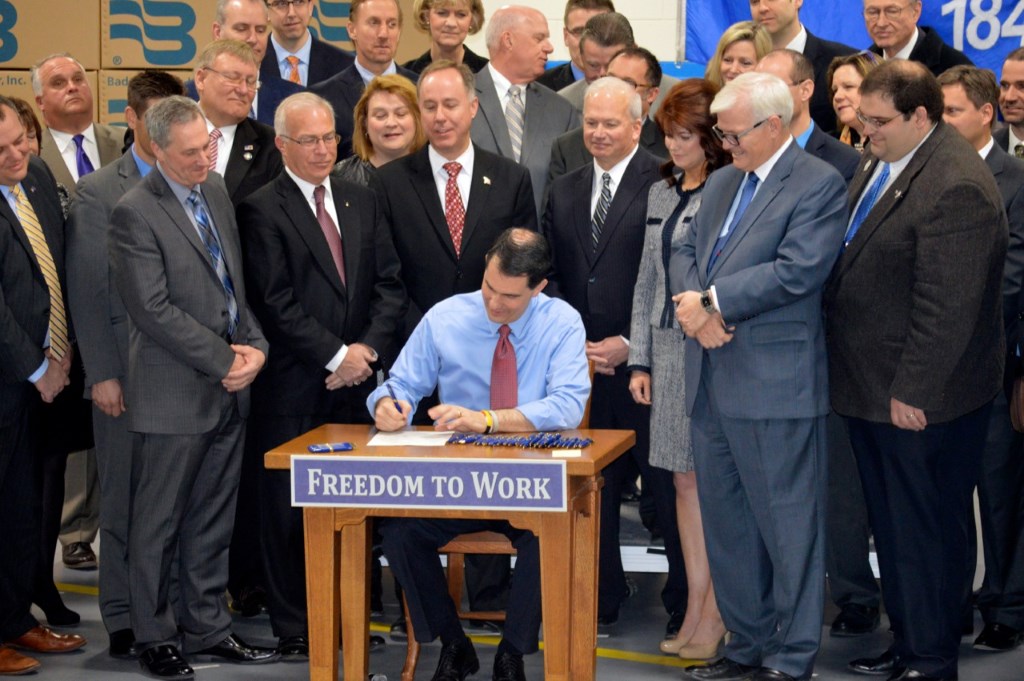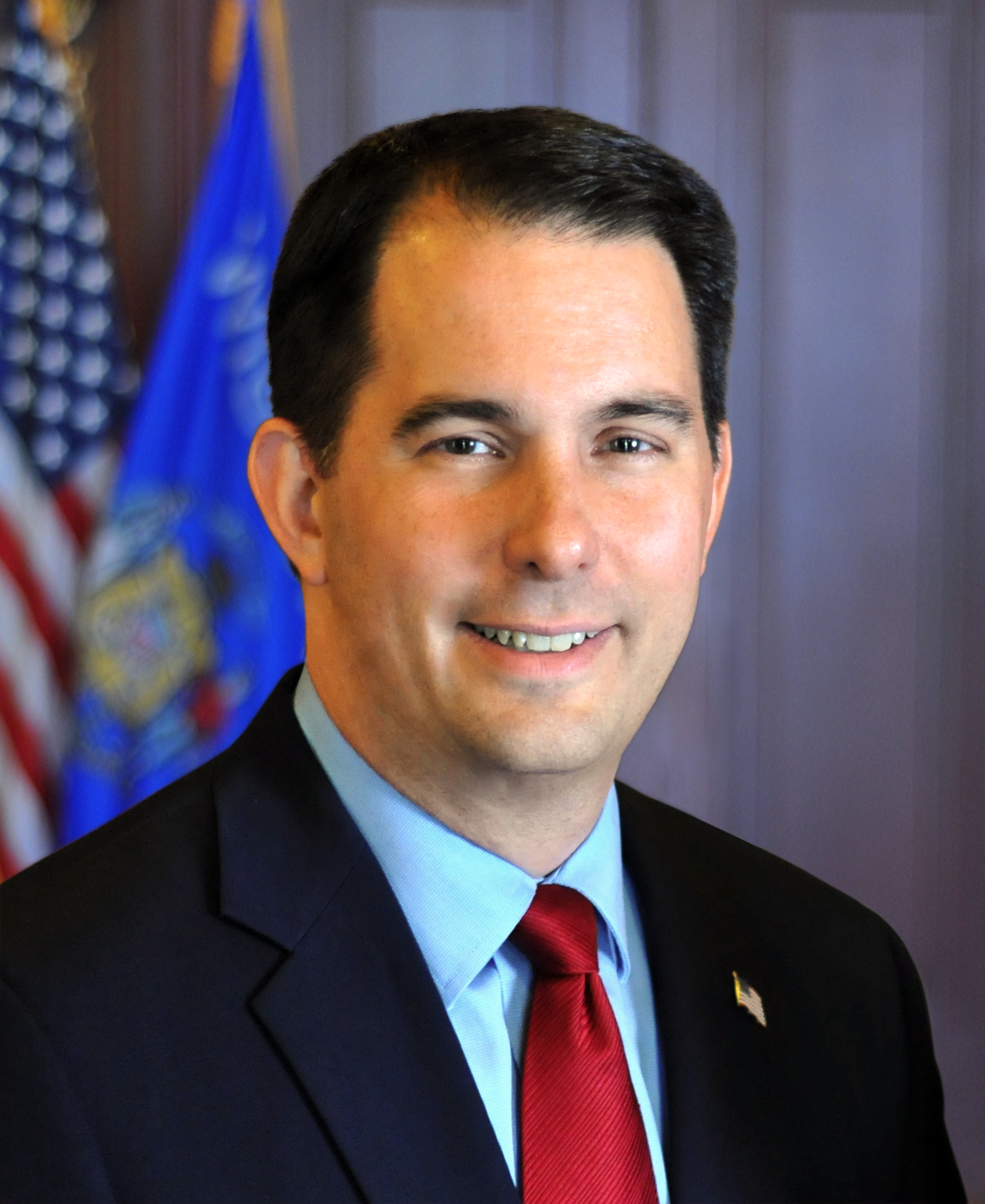Governor Walker Announces Success with Initiatives That Assist People with Disabilities in Gaining Employment
During the two most recent federal fiscal years, Wisconsin helped a record 9,500 individuals with disabilities overcome barriers to employment.
Madison – Governor Scott Walker is traveling throughout the state today to highlight the success of workforce development initiatives that work to employ people with disabilities. Governor Walker will visit HSHS St. Vincent Hospital in Green Bay, Aspirus Riverview Hospital in Wisconsin Rapids, and Mayo Clinic Health System in Eau Claire to tout the success of workforce development programs like Project SEARCH, which teaches students marketable, transferable, and competitive skills to help them transition into Wisconsin’s workforce.
“A top priority for us as we continue to move Wisconsin forward is rewarding work,” Governor Walker said. “This means removing barriers to work so that anyone who wants a job can find a job – and a good-paying career. We know a strong Wisconsin workforce is one that celebrates and promotes the unique abilities and talents of all employees, including those with disabilities. Workforce development programs like Project SEARCH help make this a reality by providing students with disabilities with the practical skills and experience they need to thrive in the career of their choice.”
“While there has been an explosion of Americans on disability rolls, the fact is that people with disabilities can be a talent solution that our economy needs,” said Jennifer Laszlo Mizrahi, President of RespectAbility, a non-profit fighting stigmas and advancing opportunities for people with disabilities. “Governor Walker is creating tangible progress by replacing broken programs with proven solutions that are win-win-win for people with disabilities, employers and taxpayers alike. Thanks to his vision and leadership, youth with disabilities are able to have the dignity and money that a job provides – instead of a lifetime of dependency and despair.”
Project SEARCH is part of Governor Walker’s Year of A Better Bottom Line. Developed in 1996 by Nurse J. Erin Riehle at the Cincinnati Children’s Hospital Medical Center, the cornerstone of Project SEARCH is total immersion in a business environment for students with disabilities. In 2014, Governor Walker announced an expansion of the Project SEARCH program and allocated $850,000 to expand the number of Project SEARCH sites in Wisconsin from seven to 27 in the following years. Project SEARCH sites in Wisconsin have an average employment success rate of 88 percent. Learn more about Project SEARCH here.
“Project SEARCH and other worker training programs offered through the Division of Vocational Rehabilitation (DVR) are a win for individuals with disabilities and a win for employers,” Department of Workforce Development Secretary Ray Allen said. “Individuals with disabilities have proven time and again that they want to work, and when given the opportunity, they demonstrate that they are some of the most dedicated, passionate and trustworthy employees an employer can have.”
Governor Walker’s 2017-19 budget proposal includes several initiatives to promote employment for individuals with disabilities, including:
- Invests $35 million in General Purpose Revenue (GPR) to maintain the maximum federal funding for the Department of Workforce Development (DWD) Division of Vocational Rehabilitation. DVR helps individuals with disabilities obtain and thrive in their jobs. As a result, the total funding for DVR will be $185 million over the biennium.
- $7.6 million in funding to support and expand programs that ensure students with disabilities gain the practical skills they need for life after high school. This includes $6.1 million to fund awards for school districts that successfully place students with disabilities in employment as well as $1.5 million to support the developments of school district efforts to connect students with disabilities with employment opportunities.
- Requires the Department of Health Services (DHS) to implement reforms to the Medicaid Purchase Plan (MAPP), to eliminate the disincentive to work for people with disabilities, while protecting the most vulnerable by:
- Eliminating the premium cliff by changing the program’s premium structure to replace the existing premium cliff with incremental premiums.
- Strengthening the work requirement through proof of paid employment, substantial in-kind work, or participation in pre-employment programming.
- Incentivizes work by allowing people with disabilities on the MAPP program to earn money and build up assets and plan for retirement without being penalized now or later in life.
NOTE: This press release was submitted to Urban Milwaukee and was not written by an Urban Milwaukee writer. While it is believed to be reliable, Urban Milwaukee does not guarantee its accuracy or completeness.
Mentioned in This Press Release
Recent Press Releases by Gov. Scott Walker
Governor Walker Orders Flags to Half-Staff Honoring Master Sergeant Jonathan Dunbar
Apr 13th, 2019 by Gov. Scott WalkerGovernor Scott Walker ordered flags to half-staff on Saturday, April 14, 2018.
Governor Walker Orders Flags to Half-Staff as a Mark of Respect for Captain Christopher Truman of the Lake Mills Fire Department
Jan 3rd, 2019 by Gov. Scott WalkerCaptain Truman died on December 31, 2018, while selflessly assisting a driver of a crashed vehicle on Highway 12 near the Yahara River Bridge in Monona, Wisconsin.
Governor Walker Appoints St. Croix County Judge and Ashland County District Attorney
Jan 2nd, 2019 by Gov. Scott WalkerGovernor Scott Walker today appointed Attorney Scott J. Nordstrand to serve as a judge on the St. Croix County Circuit Court and Attorney David Meany to the position of Ashland County District Attorney.
























an underfunded proposal with limited success. At least they tried, but you have to wonder if it;s not geared at getting the companies money rather than the disabled employees.